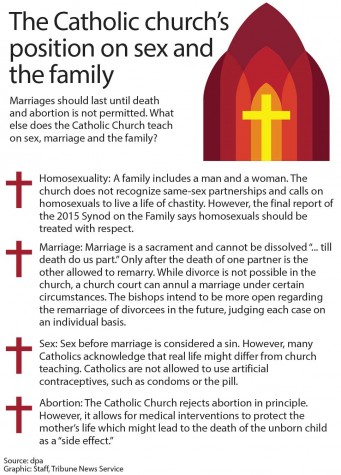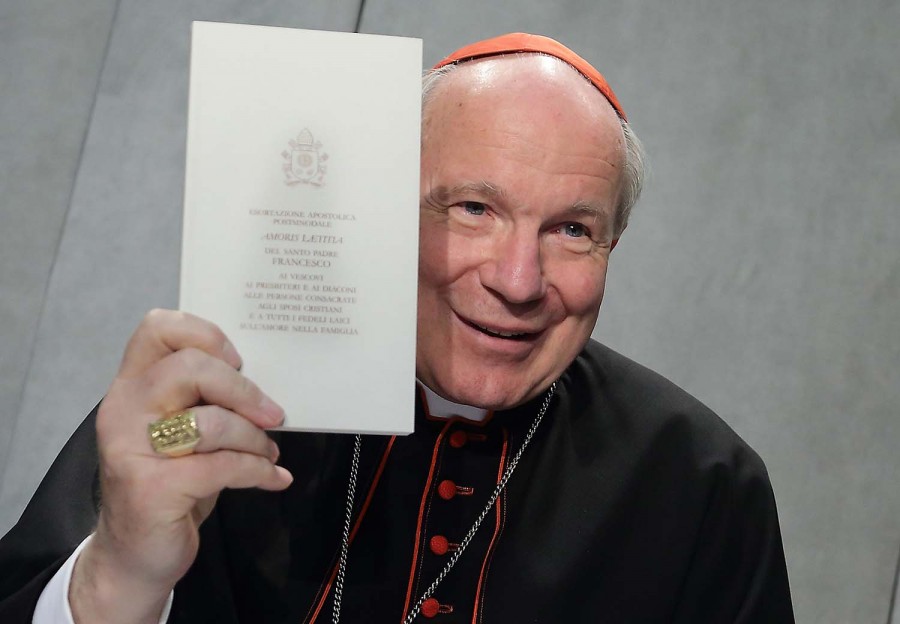Pope Francis urges acceptance and respect in new exhortation
Cardinal Christoph Schonborn holds the Apostolic Exhortation "Amoris Laetitia," or The Joy of Love, by Pope Francis on April 8, 2016 during a press conference in the Vatican Holy Press Room at the Vatican in Vatican City. (Evandro Inetti/Zuma Press/TNS)
April 15, 2016
On April 8, Pope Francis released a new document, “Amoris Laetitia”, which translates to “The Joy of Love”, an exhortation on the family that reflects on family life, vocations, love, acceptance, individual conscience, and pastoral attitudes.
The exhortation does not change existing doctrine, but instead builds upon it and puts doctrine into a modern perspective.
“The Joy of Love experienced by families is also the joy of the Church,” says the opening sentence of the document, communicating the direction and focus of the exhortation.
The document describes family life and asks priests advising and leading their communities to consider the complexities of people’s lives.
In the document, Francis focuses on the idea that the Church should be accepting, with the goal of welcoming all people so that they can grow closer to God. To achieve this, “Amoris Laetitia” encourages the clergy to actively reach out to the laity with respect, compassion, and open-mindedness.
“It can no longer simply be said that all those living in an ‘irregular situation’ are living in a state of mortal sin,” said Francis in the document, according to America Magazine.
“Amoris Laetitia” declared that pastoral solutions, methods, and attitudes need to reflect the locality of each Church community, as the Church is diverse and broad, with different needs and issues affecting different areas.
The document also asks pastors to support people in the development of their consciences, which strengthen morals and allow people to recognize God’s message in their lives. Francis affirms that conscience is not greater than doctrine; instead, he insists that while doctrine must be followed, clergy should be sensitive to personal conscience and circumstances.
In keeping with this idea, Pope Francis declared that divorced or remarried men and women are not excommunicated and that they need to be welcomed into the Church.
To the disdain of more liberal church members, Francis affirmed current church teachings on marriage, upholding the view that marriage needs to be between a man and a woman. But at the same time, he emphasized the need to respect people’s situations and not hold them to impossible or unfair standards. He also stressed respecting homosexual men and women.
“Love does not have to be perfect for us to value it,” said Francis in the document, according to America Magazine.
Francis’ document, while compassionate, has been criticized for its lack of concrete teachings by both liberals and conservatives. It attempts to balance these two disparate religious ideologies by appealing to both groups in ways that won’t alienate either, but many believe that he has failed to do so.
Rather than providing answers to topical issues, Francis’ document takes a broader stance. General attitudes and practices are described as opposed to specific doctrine issues. In fact, Francis criticizes those who hurl doctrine at lay-people like rocks, encouraging a more personable and human approach.
“I understand those who prefer a more rigorous pastoral care which leaves no room for confusion,” said Francis, according to the National Catholic Register. “But I sincerely believe that Jesus wants a Church attentive to the goodness which the Holy Spirit sows in the midst of human weakness, a Mother who, while clearly expressing her objective teaching, ‘always does what good she can, even if in the process her shoes get soiled by the mud of the street,’”.
In saying this, Francis expressed that he is not trying to impose his personal views, but is trying to communicate his interpretations.
While perhaps not earth-shattering, the central message of “Amoris Laetitia” that all people are welcome in the Church as individuals who deserve love and compassion certainly is a positive message for Pope Francis and the Church to build upon.




